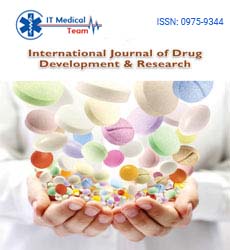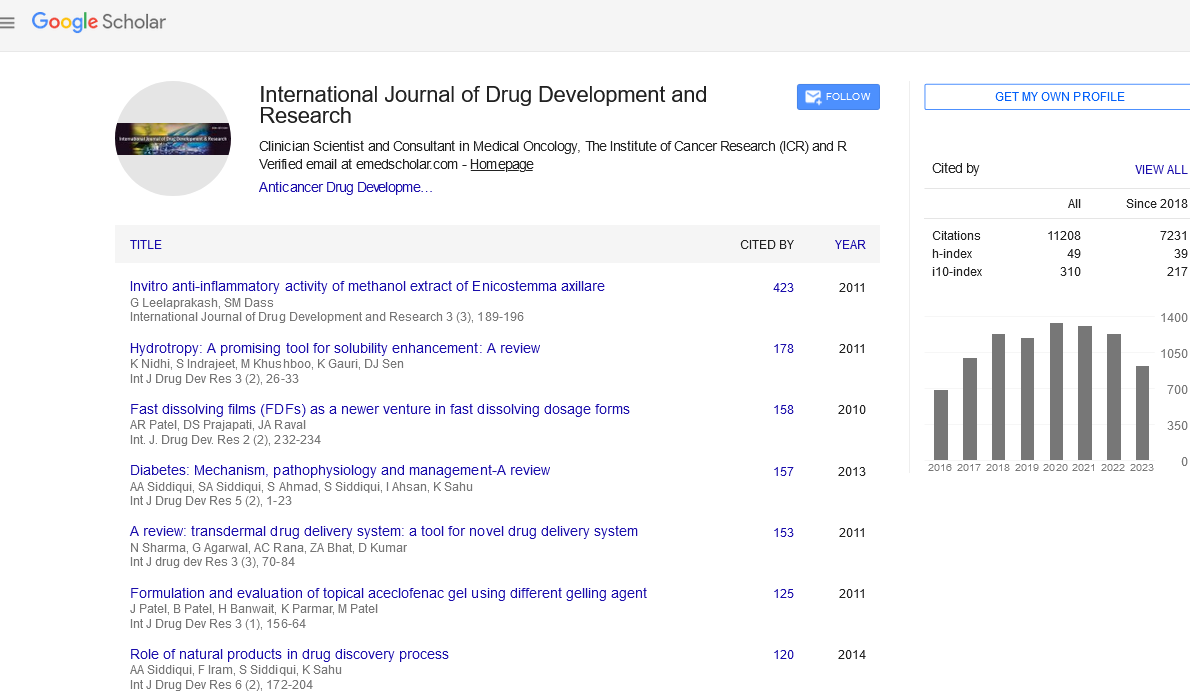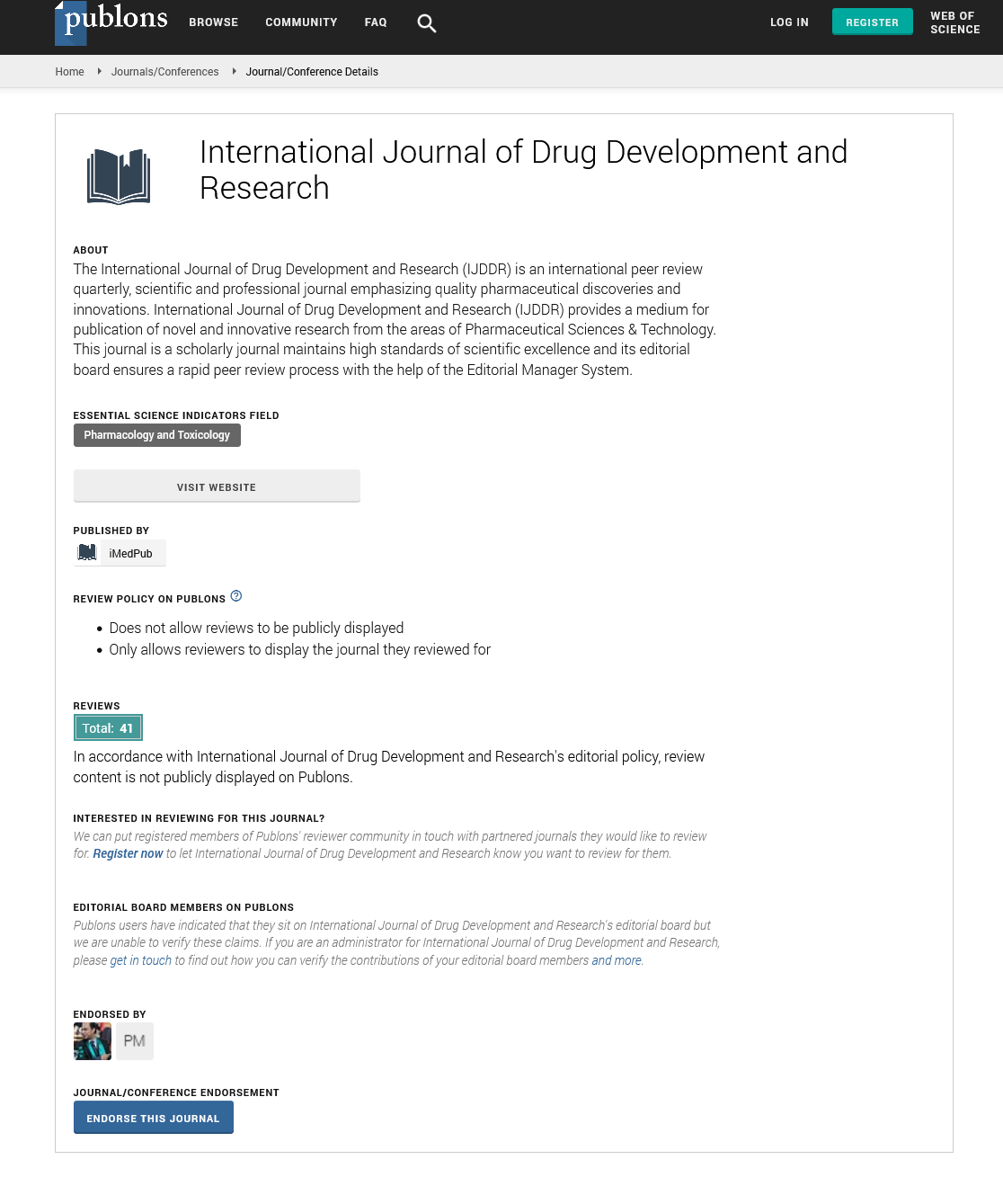Perspective - (2023) Volume 15, Issue 6
Advancements in drug development and research on COVID-19: A comprehensive overview
Garg Hagmann*
Department of Drug Research, University of Vienna, Vienna, Austria
*Correspondence:
Garg Hagmann, Department of Drug Research, University of Vienna, Vienna,
Austria,
Email:
Received: 06-Nov-2023, Manuscript No. ijddr-23-14342;
Editor assigned: 08-Nov-2023, Pre QC No. P-14342;
Reviewed: 22-Nov-2023, QC No. Q-14342;
Revised: 29-Nov-2023, Manuscript No. R-14342;
Published:
08-Dec-2023
Introduction
The emergence of the novel Coronavirus, SARS-CoV-2,
in late 2019 led to a global health crisis, with COVID-19
affecting millions of lives worldwide. The urgent need
for effective treatments and vaccines prompted an
unprecedented surge in drug development and research
efforts. This article provides a comprehensive overview
of the progress made in understanding and combating
COVID-19 through drug development and research.
Description
Understanding the virus
To develop effective drugs, a deep understanding of the
virus's structure and mechanisms is crucial. Researchers
quickly deciphered the genetic code of SARS-CoV-2,
enabling a targeted approach in drug development. The
virus primarily infects human cells through the Angiotensin-Converting Enzyme 2 (ACE2) receptor, presenting a key
target for potential therapeutics.
Repurposing existing drugs
One strategy that gained momentum early in the pandemic
was drug repurposing, leveraging existing medications for
new therapeutic purposes. Drugs originally designed for
other viral infections, such as remdesivir (initially developed
for Ebola) and favipiravir (an influenza drug), were among
the first candidates explored for COVID-19 treatment.
These repurposed drugs showed varying degrees of efficacy,
with remdesivir receiving emergency use authorization in
several countries.
Antiviral agents
As researchers delved into understanding the virus's life
cycle, antiviral agents emerged as a promising avenue for
drug development. Protease inhibitors, which interfere
with the virus's ability to replicate, gained attention. Drugs
like lopinavir/ritonavir, initially developed for HIV, were
repurposed with hopes of inhibiting viral replication.
However, subsequent clinical trials yielded mixed results,
and these drugs did not become primary treatment options.
Monoclonal antibodies
Monoclonal antibodies, laboratory-created proteins that
mimic the immune system's ability to fight off harmful
pathogens, became a focal point in COVID-19 drug development. Drugs like bamlanivimab and casirivimab/imdevimab received emergency use authorization for
the treatment of mild to moderate COVID-19 cases.
These monoclonal antibodies demonstrated effectiveness
in reducing the severity and duration of symptoms,
particularly when administered early in the course of the
disease.
Vaccine development
While drug development aimed to treat those already
infected, vaccine research focused on prevention. The
unprecedented speed at which COVID-19 vaccines
were developed showcased the collaborative efforts of
scientists, governments, and pharmaceutical companies.
Vaccines from Pfizer-BioNTech, Moderna, AstraZeneca,
and Johnson and Johnson received regulatory approval,
providing a powerful tool in controlling the spread of the
virus.
mRNA technology breakthrough
The Pfizer-BioNTech and Moderna vaccines marked a
ground-breaking milestone in vaccine technology. These
vaccines utilized messenger RNA (mRNA) to instruct cells
to produce a harmless piece of the virus (the spike protein)
to stimulate an immune response. The success of mRNA
vaccines not only revolutionized vaccine development
but also paved the way for potential applications in other
infectious diseases.
Challenges and controversies
Despite the significant progress, drug development
for COVID-19 faced challenges and controversies.
The politicization of certain treatments, such as
hydroxychloroquine, created confusion and hindered the
scientific community's ability to communicate effectively
with the public. Additionally, concerns over equitable access
to vaccines highlighted the need for global cooperation in
addressing the pandemic.
Ongoing research
The fight against COVID-19 is far from over, and ongoing
research continues to explore new treatments and refine
existing ones. Antiviral drugs with novel mechanisms of
action are in development, aiming to target specific stages
of the virus's life cycle more effectively. Combination
therapies, utilizing a mix of drugs with complementary
mechanisms, are also being investigated to enhance
treatment efficacy.
Emerging variants and adaptation
The emergence of new variants of the virus has raised
concerns about the potential impact on existing treatments
and vaccines. Researchers are closely monitoring these
variants and adapting drug development strategies to
address their unique challenges. This ongoing surveillance
underscores the dynamic nature of the virus and the need
for nimble research responses.
Conclusion
The unprecedented global effort in drug development and
research to combat COVID-19 has yielded significant
achievements in a short period. From repurposing existing
drugs to the ground-breaking mRNA vaccine technology,
the scientific community has demonstrated remarkable
resilience and adaptability. As research continues,
collaboration and data-sharing remain crucial for staying
ahead of the virus and ensuring that effective treatments
reach all corners of the globe. The lessons learned from
this pandemic will undoubtedly shape future approaches
to infectious disease management and pave the way for a
more prepared and collaborative global health community.






